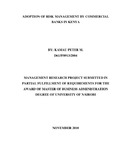Adoption of Risk Management by Commercial Banks in Kenya
Abstract
The banking sector plays are very important role in the economy and the stability of the
sector can not be over emphasized. Central bank of Kenya is mandated to regulate the
industry. By the end of 2009 there were 44 licensed commercial banks operating in the
country. Since 2005 CBK adopted risk based supervision. Global trends such as Basel
framework requires bank to establish risk management systems to measure and mitigate
risks. Several theories on risk management have been put across among them financial
theory, agency theory, stakeholder theory and new institutional economics. Several
studies have being conducted with bias towards tools and techniques adopted by various
institutions on credit risk management. Study on the various risk encountered by
commercial banks has not been conducted.
This study sought to identify the risks encountered by commercial banks and the risk
management practices adopted by commercial banks to mitigate against these risks.
Further the study wanted to establish the challenges faced by commercial banks in
successful implementation of risk management. A census survey was conducted for all
the licensed banks operating in Kenya. Questionnaires were administered to risk
management staff through drop and pick approach. A 56.8 percent response rate was
realized. The data was analyzed using SPSS.
The study revealed that credit, operation, reputation and compliance risks as critical and
commonly encountered. Majority of the banks have risk management structures in place.
However the quality of the same could not be ascertained. Majority of the banks were
found to use both qualitative and quantitative methods to measure risk. Scenario analysis
was found to be the most common used technique to measure risk. Budget constraint,
complexity of risk management process and high training costs were identified as the
main challenges facing implementation of risk management.
Progress has been made in risk management by commercial banks in Kenya as revealed
by the study as most of the banks have risk management structures in place. This can
partly be attributed by enhanced regulation and also realization of the banks on the importance of risk management. Despite the progress achieved so far there need to enhance risk management in the banking sector in order to comply with international standards so as to remain competitive. The challenges identified also need to be addressed through stakeholders’ concerted efforts.
Citation
MBA ThesisSponsorhip
University of NairobiPublisher
School of Business, University of Nairobi

